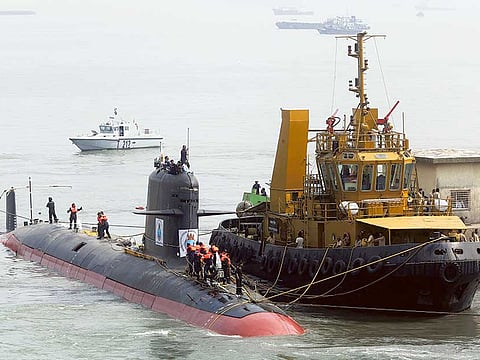India orders probe into submarine data leak
Source of leak appears to be from overseas and not from India, defence ministry says

New Delhi: In a major security breach, highly classified information on what makes Scorpene-class submarines so crucial for India’s security have been leaked, with excerpts of the operating manual released online by an Australian newspaper.
‘The Australian’ newspaper said the 22,400-page leak has details of combat capabilities of the six Scorpene-class submarines that French shipbuilder DCNS has designed for Indian Navy.
The information may prove to be a bonanza for India’s rivals such as Pakistan.
Excerpts published in redacted form on the newspaper’s website contained highly sensitive details of the submarine including technical manuals and models of the boat’s antennae.
According to the report, “the leaked DCNS data details the secret stealth capabilities of the six new Indian submarines, including what frequencies they gather intelligence at, what levels of noise they make at various speeds and their diving depths, range and endurance — all sensitive information that is highly classified.
“The data tells the submarine crew where on the boat they can speak safely to avoid detection by the enemy. It also discloses magnetic, electromagnetic and infrared data as well as the specifications of the submarine’s torpedo launch system and the combat system.”
The Australian reported that the leak occurred in France in 2011. At the moment, it’s unclear whether the leak of data came from France or India, where the six Indian submarines are being built.
Indian Defence Minister Manohar Parrikar on Wednesday described the data release as a case of hacking.
“The Navy Chief has been asked to analyse what exactly has been leaked. It came to my knowledge at about 12 AM today. What I understand is there is a hacking. So we will find out all this,” Parrikar said.
Reacting to allegations that the leak may have been from India, the Defence Ministry issued a statement saying the source of leak appears to be from overseas and not from India.
“The available information is being examined at Integrated Headquarters, Ministry of Defence (Navy) and an analysis is being carried out by the concerned specialists. It appears that the source of leak is from overseas and not in India,” the statement by the Indian Navy read.
DCNS also issued a statement in this regard.
“As a serious matter pertaining to the Indian Scorpene programme, French national authorities for defence security will formally investigate and determine the exact nature of the leaked documents. The matters in connection to India have no bearing on the Australian submarine programme which operates under the Australian government’s arrangements for the protection of sensitive data,” said the DCNS statement.
India had ordered the submarines in a deal worth USD three billion. The first of the submarines built at the Mazagon Docks in Mumbai began sea trials in May. The submarines are so silent underwater that they are extremely difficult, if not impossible to detect. But now their sonar capabilities, the noise they generate and details of the combat system they are armed with are totally exposed.
The leak of documents related to Scorpene-class submarines is likely to create a major strategic problem for India apart from countries like Malaysia and Chile which also use its variants.
DCNS also won a bid in April to design Australia’s new USD 50 billion submarine fleet, and the report said the leak could affect the security of top-secret data on the submarines. DCNS, which is two-thirds owned by the French government, will design 12 new submarines for Australia.
“Any stealth advantage for the Australian navy’s new submarines would be gravely compromised if data on its planned combat and performance capabilities was leaked in the same manner as the data from the Scorpene. The leak will spark grave concern in Australia and especially in the US, where senior navy officials have privately expressed fears about the security of top-secret data entrusted to France,” the Australian said in its report.



